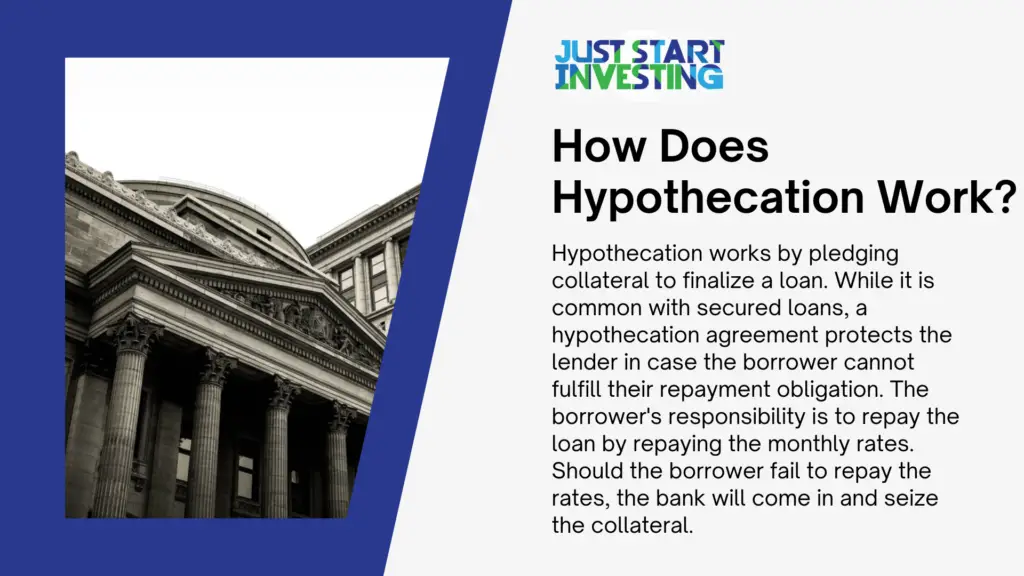Hypothecation is the process of using collateral in exchange for a loan. Hypothecation is common practice with many types of secured loans such as mortgages, auto loans, and in some cases, personal loans. An example of hypothecation is when applying for a mortgage. The bank will require collateral to finalize the loan. So the bank and the borrower agree on the property to be used as collateral. The bank doesn’t own the property but can seize it if the borrower fails to repay the loan (default).
How Does Hypothecation Work?
Hypothecation works by pledging collateral to finalize a loan. While it is common with secured loans, a hypothecation agreement protects the lender in case the borrower cannot fulfill their repayment obligation. The borrower’s responsibility is to repay the loan by repaying the monthly rates. Should the borrower fail to repay the rates, the bank will come in and seize the collateral.

How Does Hypothecation work With Different Types Of Secure Loans?
Hypothecation works with different types of secure loans. The most common are mortgage loans, personal secure loans, and auto loans. Below is an explanation of how each one works.
- Hypothecation In Mortgage Loans
A hypothecation agreement ensures the bank can retrieve its investment in case the borrower fails to repay the mortgage. Since most people lack the funds to pay upfront for a house, a mortgage loan is used. The loan, however, requires collateral. The borrower agrees to use their home as collateral when using a mortgage loan.
Even though the bank isn’t the owner of the home (collateral), it can seize it if the borrower fails to meet the repayment terms.
- Hypothecation In Auto Loans
Another hypothecation example is using a vehicle as collateral to secure a loan. A vehicle can be a car, a motorcycle, or an RV. The same terms apply to any other hypothecation agreement. Should the borrower fail to repay the loan, the lender can seize the auto used as collateral.
- Hypothecation In Personal Secured Loans
Personal loans are mostly unsecured. This means that there is no collateral used. However, that doesn’t mean personal secure loans don’t exist. When a borrower takes out a personal loan, the lender might require collateral on a bigger amount. This means that the lender will require some backing of the loan agreement to reduce risk. With personal secure loans, collateral can be a vehicle, a home, cash from a savings account, and more.
There are other types of secure loans where hypothecation is used. When buying commercial real estate, the lender might require you to put another property as collateral. In some cases, the lender might require multiple pieces of collateral.
Why Hypothecation Exists?
Hypothecation exists because it helps the lenders cover the risk of agreeing on a loan. In the case of the borrower, a hypothecation agreement means more favorable loan repayment terms. But a hypothecation agreement can also be risky. That’s why lenders and financial institutions do extensive research on borrowers before approving a loan. The bank doesn’t want borrowers to lose their homes, vehicles, or other assets through hypothecation. But they have to cover risks. Should a borrower fail to repay, the bank will seize the collateral asset to recoup funds owed by the borrower.
A hypothecation agreement also speeds up the approval process. A borrower will get access to funding much faster if the collateral is used.
Should You Prioritize Hypothecated Loans?
Yes, you should. Hypothecated loans, or hypothecation loan, makes borrowers susceptible to risk. Since loans also come unsecured, it means repaying hypothecation loans should always be the priority. If not, the borrower will lose the collateral.
This means you should always prioritize making auto loan or mortgage payments over credit card payments. While credit cards come with dangers, and credit card misuse can seriously put you in debt, you aren’t losing your home or vehicle over late repayments. There are additional hidden benefits of paying off debt, but the point still remains.
Conclusion
A hypothecation agreement protects the lender by covering risk. It also benefits the borrower by significantly speeding up the approval process and giving borrowers more favorable rates. What borrowers need to do to make sure they don’t lose the collateral is repay the monthly rates.

Partner at Vega Capital Management - a private funds management company.
An experienced portfolio manager with 10+ years of proven and reputable track record in investment management and financial analysis. Currently, a partner at one of the fastest-growing private fund management companies in southeast Europe, Kiril has been tending to a loyal international base of client-investors and partners. When he is not crunching numbers and increasing his client’s wealth, he reminisces about his Michelin-star restaurant cheffing years and fondness of the culinary arts.

